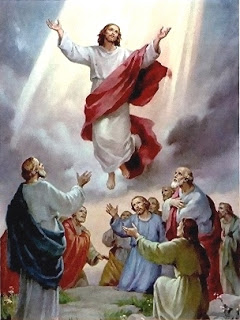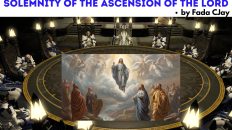SOLEMNITY OF THE ASCENSION OF THE LORD
The
Catholic Church in Brazil celebrates this Sunday as Ascension Day due to
pastoral reasons. To reflect on the readings, we shall consider the following:
Catholic Church in Brazil celebrates this Sunday as Ascension Day due to
pastoral reasons. To reflect on the readings, we shall consider the following:
-The significance of Ascension
-Paradox of the Ascension
-Ascension in the readings
-Relationship between Ascension and Christmas
-The message of the Ascension
Part
of the Creed which we profess every Sunday and other days of solemnities: “He
ascended into heaven”. This is what we celebrate today. But then, why does
the Catholic Church give more attention to a single act done by Jesus
(ascension), since he has conquered death and redeemed us by his death and resurrection? Christ’s
Ascension was the culmination of God’s divine plan for Christ Jesus – his
return to his Father with his “Mission Accomplished.” Ascension is
the grand finale of all his words and of the works He has done for us and for
our salvation. It is a culmination, but not the conclusion. It is a new
beginning. It is an act that brings hope to humanity and great yearning for our
heavenly homeland. This is what Jürgen Moltmann expresses. Moltmann understands the Christian
faith as essentially hope for the future of human beings promised by resurrected
Christ. Thus, for him it is an attitude of expectancy that underlies all of
faith.
of the Creed which we profess every Sunday and other days of solemnities: “He
ascended into heaven”. This is what we celebrate today. But then, why does
the Catholic Church give more attention to a single act done by Jesus
(ascension), since he has conquered death and redeemed us by his death and resurrection? Christ’s
Ascension was the culmination of God’s divine plan for Christ Jesus – his
return to his Father with his “Mission Accomplished.” Ascension is
the grand finale of all his words and of the works He has done for us and for
our salvation. It is a culmination, but not the conclusion. It is a new
beginning. It is an act that brings hope to humanity and great yearning for our
heavenly homeland. This is what Jürgen Moltmann expresses. Moltmann understands the Christian
faith as essentially hope for the future of human beings promised by resurrected
Christ. Thus, for him it is an attitude of expectancy that underlies all of
faith.
The
ascension brings about a paradoxical insight: Christ ascending to the Father,
and remaining with us at the same time, till the end of times. What we
celebrate today is Jesus’ exaltation and the end of his earthly existence, as a
prelude to the gift of the Spirit. The ascended Jesus is still with us
because of his promise, “I am with you always; yes, to the end of time.”
ascension brings about a paradoxical insight: Christ ascending to the Father,
and remaining with us at the same time, till the end of times. What we
celebrate today is Jesus’ exaltation and the end of his earthly existence, as a
prelude to the gift of the Spirit. The ascended Jesus is still with us
because of his promise, “I am with you always; yes, to the end of time.”
The readings
of today give more meaning to this feast. In the first reading (Acts 1: 1-11), Luke gives an
account of the event of the Ascension as recorded in the first chapter of the
Acts of the Apostles. First, Jesus instructed his apostles to remain in
Jerusalem and wait for the baptism by the Holy Spirit so that they might become
his “witnesses to the ends of the earth” by the power of the Holy Spirit. Then
a cloud took Jesus from the sight of the disciples and two heavenly messengers
in white garments gave them the assurance of Jesus’ return in glory. The
Psalm response, “God goes up with shouts of joy: he ascends with trumpets’
blast”. This celebrates God’s universal kingship. The Psalm was originally
sung in connection with a cultic procession honoring the Ark of the Covenant.
By his Ascension, the risen Lord (the New Covenant) likewise “mounts his
throne” in glory. The message continues in the second reading
in a more dynamic way. From the second reading (Eph 1: 17-23; alternate Hebrews 9:
24-28; 10: 19-23): In Ephesians, Paul explains the theological meaning of
Jesus’ exaltation by saying, “May God enlighten the eyes of our hearts so
that we may know the great hope to which we have been called.”
Our great hope is that one day we too will be ascending to heavenly
glory, provided that, with His grace, we live out our faith in Him through the
mission of loving service He entrusts to us.
of today give more meaning to this feast. In the first reading (Acts 1: 1-11), Luke gives an
account of the event of the Ascension as recorded in the first chapter of the
Acts of the Apostles. First, Jesus instructed his apostles to remain in
Jerusalem and wait for the baptism by the Holy Spirit so that they might become
his “witnesses to the ends of the earth” by the power of the Holy Spirit. Then
a cloud took Jesus from the sight of the disciples and two heavenly messengers
in white garments gave them the assurance of Jesus’ return in glory. The
Psalm response, “God goes up with shouts of joy: he ascends with trumpets’
blast”. This celebrates God’s universal kingship. The Psalm was originally
sung in connection with a cultic procession honoring the Ark of the Covenant.
By his Ascension, the risen Lord (the New Covenant) likewise “mounts his
throne” in glory. The message continues in the second reading
in a more dynamic way. From the second reading (Eph 1: 17-23; alternate Hebrews 9:
24-28; 10: 19-23): In Ephesians, Paul explains the theological meaning of
Jesus’ exaltation by saying, “May God enlighten the eyes of our hearts so
that we may know the great hope to which we have been called.”
Our great hope is that one day we too will be ascending to heavenly
glory, provided that, with His grace, we live out our faith in Him through the
mission of loving service He entrusts to us.
The
Ascension is most closely related, in meaning, to Christmas. In Jesus,
the human and the divine become united in the person and life of one man; that’s
Christmas. At the Ascension, this human being – the resurrected body of
Jesus – became for all eternity a part of who God is. It was not the
spirit of Jesus or the divine nature of Jesus that ascended to the
Father. It was the resurrected body of Jesus: a body that the disciples
had touched, a body that had eaten and drunk with them both before and after
His Resurrection, a real, physical, but gloriously restored body, bearing the
marks of nails and a spear. This is what ascended. This is what,
now and forever, is a living, participating part of God.
Ascension is most closely related, in meaning, to Christmas. In Jesus,
the human and the divine become united in the person and life of one man; that’s
Christmas. At the Ascension, this human being – the resurrected body of
Jesus – became for all eternity a part of who God is. It was not the
spirit of Jesus or the divine nature of Jesus that ascended to the
Father. It was the resurrected body of Jesus: a body that the disciples
had touched, a body that had eaten and drunk with them both before and after
His Resurrection, a real, physical, but gloriously restored body, bearing the
marks of nails and a spear. This is what ascended. This is what,
now and forever, is a living, participating part of God.
What message does the
ascension bring to our doorstep? “Preach
the good news and be my witnesses”. We need to be proclaimers and
evangelizers: In today’s gospel, Jesus gives his mission to all the believers:
“Go out to the whole world and proclaim the gospel to every creature.”
This mission is not given to a select few but to all believers. To be a
Christian is to be a proclaimer and an evangelizer. There is a difference
between preaching and proclaiming. “We preach with words but we proclaim with
our lives.” As we celebrate the Lord’s return to His Father in heaven – His Ascension
— we are being commissioned to go forth and proclaim the Gospel of life and
love, of hope and peace, by the witness of our lives. On this day of hope,
encouragement and commissioning, let us renew our commitment to be true
disciples everywhere we go.
ascension bring to our doorstep? “Preach
the good news and be my witnesses”. We need to be proclaimers and
evangelizers: In today’s gospel, Jesus gives his mission to all the believers:
“Go out to the whole world and proclaim the gospel to every creature.”
This mission is not given to a select few but to all believers. To be a
Christian is to be a proclaimer and an evangelizer. There is a difference
between preaching and proclaiming. “We preach with words but we proclaim with
our lives.” As we celebrate the Lord’s return to His Father in heaven – His Ascension
— we are being commissioned to go forth and proclaim the Gospel of life and
love, of hope and peace, by the witness of our lives. On this day of hope,
encouragement and commissioning, let us renew our commitment to be true
disciples everywhere we go.
Few
days from now, we shall commemorate the outpour of the Holy Spirit upon Mary
and the Apostles, upon the church, upon our families, and upon each and every
one of us. By the Holy Spirit, we become enlivened, and our actions become
animated in a new way, making us “Christs” in the world.
days from now, we shall commemorate the outpour of the Holy Spirit upon Mary
and the Apostles, upon the church, upon our families, and upon each and every
one of us. By the Holy Spirit, we become enlivened, and our actions become
animated in a new way, making us “Christs” in the world.
We
pray and ask the Holy Spirit to continually enlighten our minds and hearts to
see what hope his call hold for us and live out the message of the ascension.
pray and ask the Holy Spirit to continually enlighten our minds and hearts to
see what hope his call hold for us and live out the message of the ascension.
Shalom!!!




